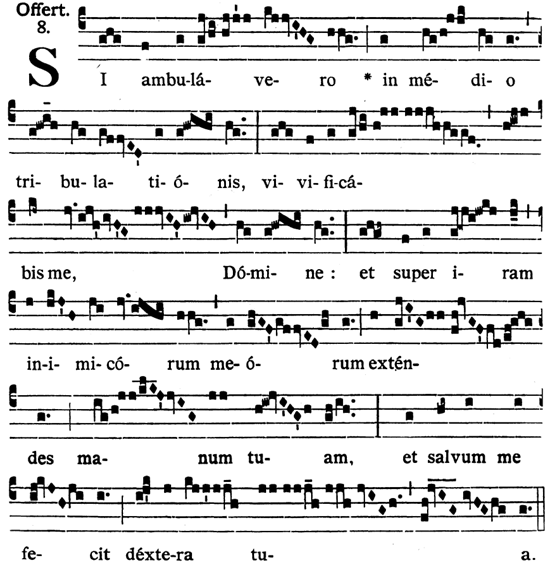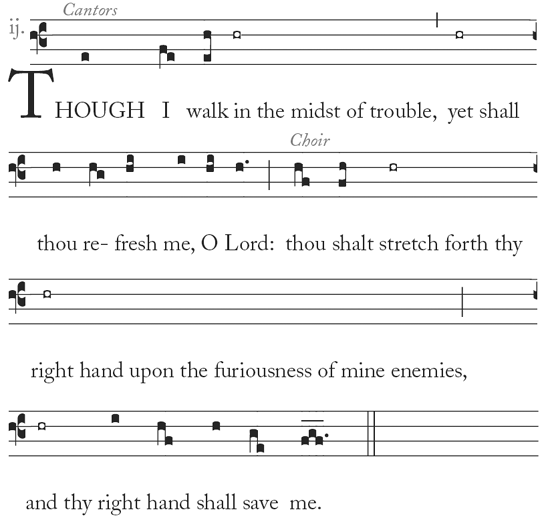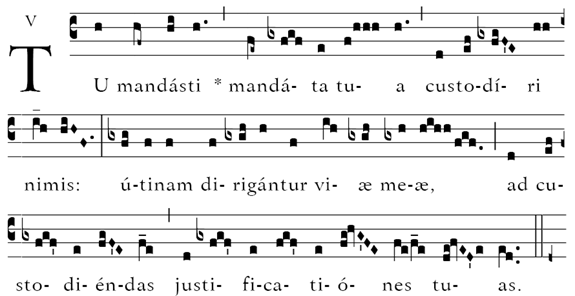Wednesday, October 22, 2008
Wednesday, September 17, 2008
If I walk in the midst of tribulation
It is a grimly sad loss when you consider a masterpiece such as the Offertory chant for this Sunday, the 25th in ordinary time. The text is "If I walk in the midst of tribulation you shall preserve my life, O Lord; you shall stretch forth your hand against the fury of my enemies; your right hand has delivered me."
Now, keep in mind the character of the Offertory chant. It combines the forward motion of the Introit (because it too is a procession) with the melismatic properties of the typical Gradual (because it too is a Psalm and is constructed to inspire reflection) to create some of the most picturesque and artistically evocative chants of the entire songbooks of the Roman Rite.
In this chant, we have a story that is well suited to composition. We have a walk in distress. We have the hand of God, and it is stretching forth. That hand is raised against enemies, and protects the believer, delivering him from them. How might this chant look? I submit that you could work years and not come up with some as spectacular as the following.

You can literally see what is happening here, and to hear it in liturgy would be to experience Psalm 137 in a way that would be otherwise impossible. The excitement emerges from the start and grows into one long phrase that culminates in this incredible melisma on the word life itself. The next long melisma occurs on another phrase you might expect it: extendes manum, the stretched forth hand, and here the chant reaches its highest melodic peak. But the sense of life and stretching doesn't end there. It continues to the third great melisma of the piece, which is on the words dextera tua. Putting them together we have the bulk of this chant consumed with a long life made possible by the hands of God.
It's great composition, even aside from its liturgical intention of preparing for the sacrifice at the altar.
Dom Johner comments: "Logically the first and second phrase belong together; they should therefore not be separated by too great a pause. Beginning and end of the two phrases are alike. In these two phrases, as well as in the later ones, we meet numerous fourths. These give life and buoyancy to the piece. To this must be added the strengthening of (vivifi)-cd-(bis), which gives added impressiveness to our Amen. The third phrase has a beginning similar to the first, descending like it to low d. We are acquainted with the melody over extendes from the Offertory of Easter Monday: Surrexit. In the spirit of Easter, confident of victory, the singer bursts out into a joyous strain over manum tuam. He knows what it means to have God's almighty hand resting upon him. Tuam calls for a continuation. The simple recitative et salvum me which follows, set as it is in the midst of a florid melody, has an especial solemn character and must not be sung too rapidly. Over tua the melody is to be divided into two bistrophas and a clivis, followed by an energetic pressus."
It is possible to still sing the Offertory proper even if you aren't prepared to sing the symphonic version above. Here is a setting from the Anglican Use Gradual that puts it in a Psalm tone that any choir can sing. This is a good idea. Singing the proper helps takes this period of Mass from having the feel of an intermission into making it part of the liturgical structure of the day.

Tu Mandasti
First, the chant is about how we've been commanded to keep God's commandments, which you might think would yield a chant that is solemn and stern, since we are being told about law.
But look: the chant is in mode 5, a major mode, a joyful mode, a mode that evokes a sort of carefree celebration of life. Why? Why did the monks choose a happy mode in which to set this text from Psalm 118? Well, if you know monks, you know that they are the happiest of people, quick to laugh and light in their demeanor. It must have always been that way. What liberates them from the cares of the world? The law of God, the order of their day, the rule.
The rule and the guidelines is what grants the sense of freedom: one of the greatest paradoxes of the Christian life. It is something we can all enjoy provided we cling to the rule. The law is what gives us freedom. Here it is in song.

Second, look at the second half. "That I might be firm in the ways of keeping your statutes." Now look at the way the notes are arranged on the last line. It looks like a path, doesn't it? It sounds like a path, the way you might arrange stones in your backyard, one stone this way, another one that way. It covers very little ground side to side (see the repeated use of the la te figure) but the motion is always forward, in a way that is comfortable to walk on, one foot in front of the other, sometimes almost as if skipping with glee. Here is the musical path, all the way to the end.
Wonderful, isn't it? You can say that this is my wild imagination at work, but once you see it and hear it can you forget it?
Here is a hard copy. And here is a book of communion antiphons with Psalms.
On organic development, social networking, and liturgy
Recently, Facebook developed a number of presentational and functional changes for its faithful - a.k.a. "The New Facebook." The redesign was touted as bringing extra functionality to its users, an easier-to-use interface, etc. - in short, an improved user experience.
To be sure, Facebook developers were making incremental, sometimes unnoticed, but definitely organic developments to this social networking liturgy. They opened up the platform to third-party developers to enrich it with their time, talent and treasure. Their treasury of new third-party compositions grew by leaps and bounds, and while the vast majority of them were of questionable value, others were seen as indispensable.
But the Consilium of New Facebook periti were promising so much more.
There was an ad experimentum period where early-adopters could voluntary opt-in to the new Facebook liturgy, with the option of going back to the usus antiquior at any time. The problems arose when the changes were imposed on the rest of the Facebook faithful. The outcry rivaled, and perhaps surpassed, that of the suppression, excommunication and expulsion of the Scrabulousian order from the Facebook realm.
Most accepted the new changes with resignation, sometimes resentful. Others, especially the early adopters, embraced the changes and sang their praises. Others, having lost the Facebook faith, left for other social networking sects, thereby writing themselves out of the Facebook of life.
Different groups of the Facebook faithful were formed in the wake of the changes. Some were formed merely to curse the darkness they saw in the new Facebook, while others were formed to call for the widespread imposition of the old Facebook liturgy. (To be sure, there was much overlapping of membership.) Other groups were formed in support of the changes, but these were looked down upon with disdain by those who were nostalgically attached to the old ways. To be sure, the disdain was mutual.
Recent converts to Facebook from other denominations like MySpace and Friendster were understandably confused by the rancor.
It remains to be seen whether a future leader of Facebook is to rise up and consider the possibility of both forms of the Facebook liturgy co-existing side-by-side, mutually enriching each other. Proponents of the changes probably would sneer at this notion; those entrenched in their old habits and devotions would probably view this proposal with suspicion, seeing it as a way to placate them before even the "old Facebook" finally morphs into the quasi-heretical "new Facebook."
Time will tell.
(Being open to the changes, I was an early adopter of the new layout. And while it took some time to get used to it - indeed, I haven't completely explored all of its possibilities and still get lost occasionally - overall I did view it as an improvement. The improvements were logical, rational and inspiring in their own way, and while I missed some things about the old liturgy, the new one was overall quite satisfying. But not completely.
Still, I'm not worried, since Facebook is semper reformanda.)
[Originally posted 2008.09.17 on CantemusDomino.net]
Can the Catholic Church Be a Patron of the Arts Again?
The separation between these publishers and the needs and desires of Cathedrals regular Catholic parishes is deep. A very strange indifferentism and agnosticism afflicts the culture of these publishers, such that hardly anyone in the management structure itself really believes in the bulk of what they are doing—not the employees, not the composers of their music, and not those who are recording the music for demonstration purposes. Hardly anyone is happy with the system as it stands, and that is especially true of Catholic musicians at the grass roots level.
I'm all for free enterprise, but to what extent should purely commercial interests dictate what music dominates Catholic liturgy? There is a serious problem here. The sounds and texts that the Church asks for in her official documents are not those of the commercial marketplace. Instead, they need to be produced on the model of the university of old or the Church herself—less of a profit and loss model and more of a benefactor/expenditure model.
In fact, the other day I attempted a test of the proposition that you can know that music is not appropriate for Mass if you can find something like it on AM-FM radio. So far, I've not found an exception to the rule. There might be some commercial radio somewhere that can make a buck playing Josquin and Byrd, but I have my doubts.
In any case, what is need in our time is what the Church provided in the past: support for new composition and distribution of liturgical music. A major advantage here is that this will further remove us from the copyright/royalty model of the commercial marketplace and assist in promoting music in way that doesn't tax parish financial resources. Commercial publishers have become insanely obsessive on the one topic of prohibiting piracy, so much so that they forget that the real problem serious liturgical composer in our time face is not piracy but obscurity. They need to find ways to get the word out about their work.
Todd Flowerday on a radio discussion with me the other day proposed a number of practical suggestions that I think the US Bishops should think about seriously.
1) The Bishops should use every major liturgical event to commission new pieces of music. Think in particular of the Papal Masses in the United States, and the enormous controversy surrounding the hodgepodge of music that was selected. A much better route would have been to select one of the many serious American composers in the Catholic Church today (a list would have to include Kevin Allen, Kurt Poterack, Michael Lawrence, Don Roy, Richard Rice, among many others) and commission a major setting of the Ordinary parts of the Mass or of the Propers. This action would have made those Masses not only impressive events for Catholics but would have also shown that liturgy remains an important venue for serious art as well. There are many opportunities to do these apart from Papal Masses. Corporate matching gifts can be sought. There are many creative ways.
2) Bishops should consider purchasing the rights on serious compositions suitable for general use and republishing them under a Creative-Commons-type license and making them available for free download. This would take financial pressure off parishes that end up spending thousands of dollars to pay for music every year, money which ends up not in the hands of composers but mostly in the coffers of the big publishers themselves. Putting an end to this problem would be a major contribution.
3) Continue the pressure on ICEL to make its texts free to the world, not only for free download but also for commercial use. As it is, everyone who publishes the text of the Mass has to pay very high royalties to ICEL, which, despite assurances that the money is well spent, runs contrary to the charitable spirit of the faith. I'm not sure how else to put this: there is something that is just unseemly about the idea of profiting from selling the right to print the Mass texts. If the Bishops wanted to put an end to this strange system, they could do it in one day. This one action would open up the field for new composition and for the re-setting and re-publication of older works.
The Church Music Association of America is doing its part by encouraging composers to set the new Mass texts and publish these settings under a Creative Commons attribution license. What this license does is permit the free and commercial distribution of these settings without any limit whatsoever. Fire up those photocopy machines. The only restriction is that the source music be acknowledged. This is one step short of public domain, and a wonderful model.
How do artists and composers get paid under this system? This is where commissions, benefactors, and arts patrons have a big role to play. No one is in a better position than the US Bishops to raise money for this purpose. The arts community would be thrilled, and benefactors would emerge if they knew that their support were needed. There is hardly a Catholic alive is happy with the way music is in Mass. Everyone has an incentive to make a contribution. All that is needed is an organized effort.
In the end, no serious artist is finally happy and fulfilled with the "art for arts sake" model of composition and performance. The Church needs to become their haven for producing works of immortal value, and should always stand ready to accept their gifts when they are ready to be given. But today, serious musicians are mostly not attracted to liturgical venues, simply because it seems that the Church isn't very interested. This can change with a heightened consciousness.
